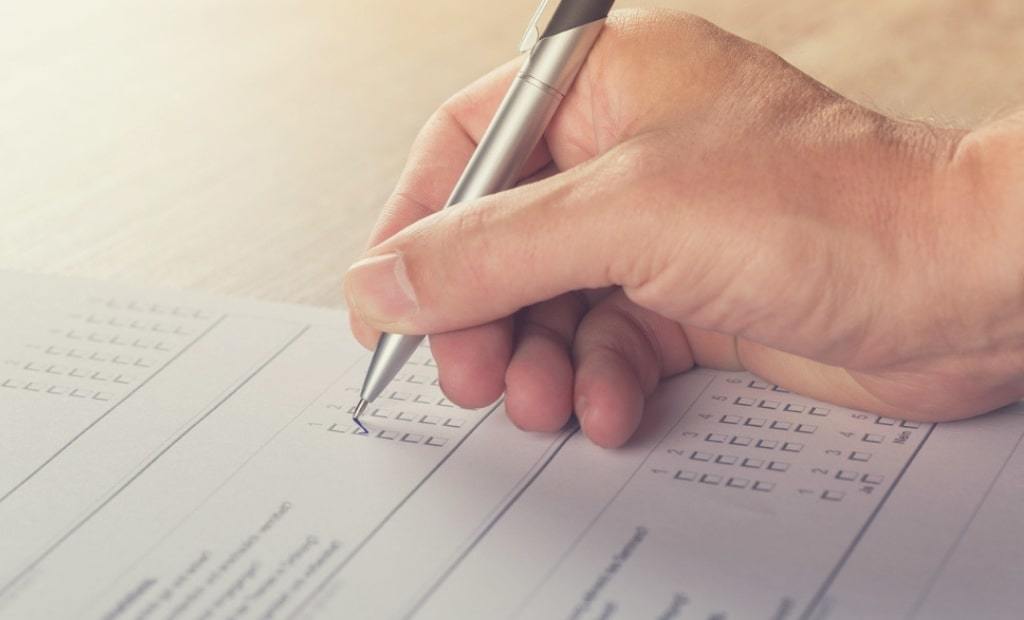There might be affiliate links on this page, which means we get a small commission of anything you buy. As an Amazon Associate we earn from qualifying purchases. Please do your own research before making any online purchase.
Have you ever felt so uncomfortable at a party that you ended up leaving without even saying goodbye? Or perhaps the mere thought of being in a social context is enough to make you feel restless and agitated.
How many times have you made up all sorts of excuses just to avoid hanging out with your friends? How many opportunities have you lost because you refused to participate in networking events?
If you’re eager to find out what you’re dealing with, perhaps an online social anxiety test might of use. Although no online quiz can replace the opinion of a licensed professional, it never hurts to give it a try.
On another note, social anxiety is treatable. One of the ways that help people cope with anxiety is the habit of mindfulness. If you’re interested in developing a mindfulness habit, I recommend The Mindfulness Journal to be your guide and companion. It features daily writing prompts designed to help lessen anxiety and teach you to appreciate the present moment.
Since not all web resources are reliable, we’ve decided to share online tests that will help you assess your anxiety. But first, let’s take some time to understand what social anxiety is and how it can affect your overall sense of happiness and well-being.
(Side note: Want a simple way to reduce your stress and anxiety? Then try writing these 35 mindfulness journaling prompts to live more in the present moment).
What You Will Learn
What is Social Anxiety?
We know for a fact that anxiety is a built-in mechanism that helps us avoid dangers. Ever since the dawn of civilization, anxiety has helped our ancestors survive and thrive in an environment were danger was lurking in every bush. Those who chose to ‘listen’ to their fear and avoid confrontation often survived to fight another day.
Long story short, anxiety has been and still is our very own alarm system, signaling critical situations that could cause physical or emotional harm.
But what happens when this alarm system becomes over-sensitive and goes off even in the absence of real danger? What happens when we begin to worry and obsess over all sorts of worst-case scenarios that have absolutely nothing to do with reality?
Well… that’s when anxiety becomes unhealthy and counterproductive, generating self-sabotaging behaviors that ruin our everyday life. And one of the most common forms of anxiety disorders is social anxiety.
Social anxiety disorder (SAD) or social phobia is a condition characterized by fear, shame, and embarrassment that we experience in everyday social interactions. This problem occurs when, for some reason, we believe others judge, ridicule, or criticize us.
In the U.S. alone over 15 million people are living with social anxiety. [1] That’s almost 7% of the entire population, dealing with a perfectly diagnosable and treatable condition.
If left unchecked, social anxiety can ruin your personal life and rob you of valuable professional opportunities, leaving you alone and unhappy. In fact, allow me to paint a clearer picture of what it’s like to live with this condition.
Here’s What Social Anxiety Feels Like
As the name suggests, social anxiety occurs in social situations or contexts. In other words, you’re so afraid of what others might think of you, that you end up avoiding any situation where you might have to interact with people.
At the core of social anxiety, there’s always the fear of criticism, ridicule, or evaluation. And the worst part is that if you keep telling yourself that you’re awkward and clumsy, you eventually start behaving in awkward and clumsy ways — kind of like a self-fulfilling prophecy.
Like for example when you’re at a party, and you’re so nervous and agitated – because you think people are looking at you – that you end up spilling wine all over your white shirt. And, of course, that will attract some attention which comes to confirm the fact that people are indeed looking at you.
But what many socially anxious individuals fail to observe is that anxiety itself is causing all this uncomfortable chain of events.
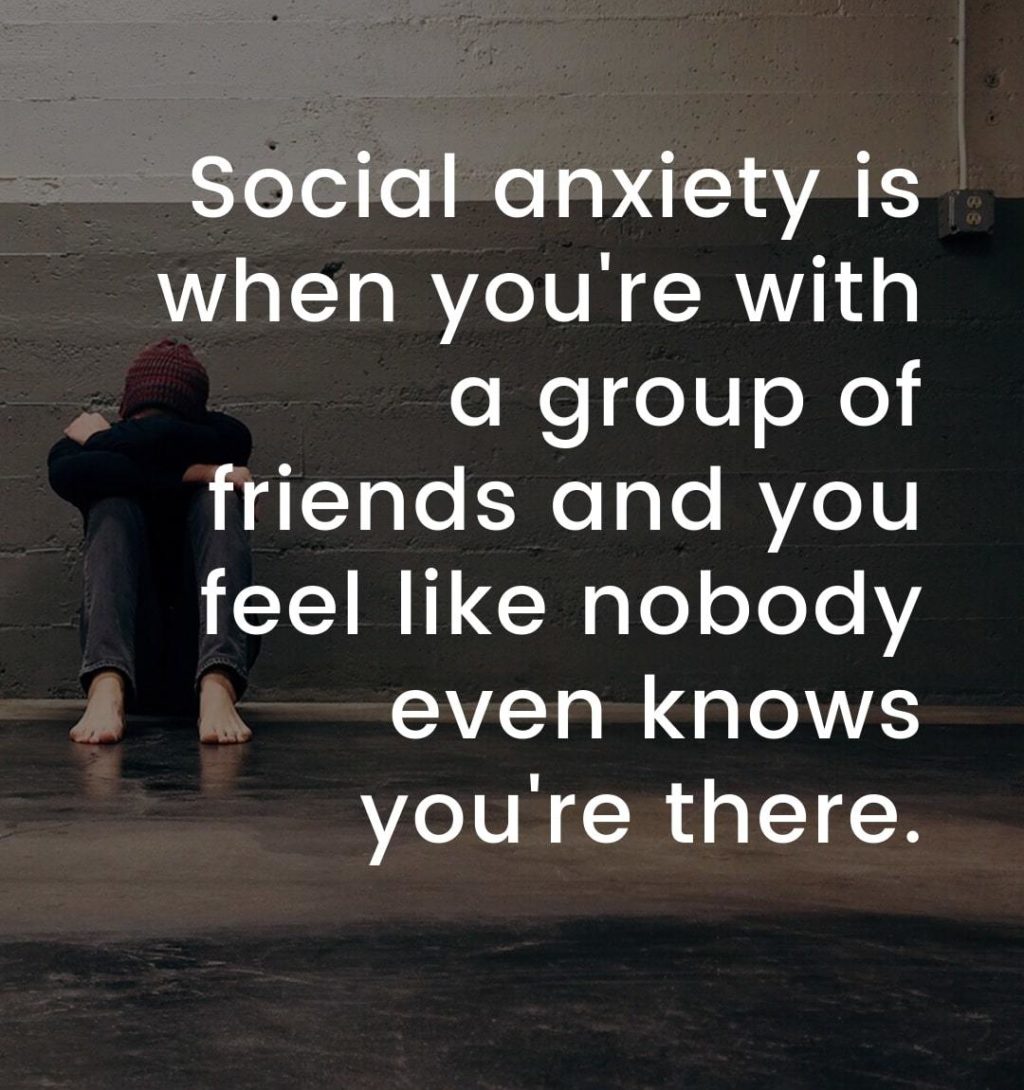
At some point, fear can be so intense and debilitating that you simply refuse to partake in social gatherings or, if you’re somehow ‘forced’ to hang out, you will do everything you can to make yourself ‘invisible.’ Some even go so far as to fabricate all sorts of ridiculous excuses and elaborate lies to justify their absence.
And even if you’re lucky enough to be blessed with friends and family members who are patient and understanding, sooner or later they will grow tired of your excuses. Long story short, people will stop asking you out because they already know the answer.
Perhaps you feel comfortable, and ‘safe’ every time you avoid yet another uncomfortable situation, but all you’re doing is setting yourself up for disappointment and unhappiness.
From a professional standpoint, social anxiety can be a significant roadblock to your growth and success. In other words, when you’re struggling with anxiety, you might find it difficult to collaborate with your peers, go to networking events, and put yourself out there. In short, you lose valuable opportunities that could have helped you grow professionally.
All and all, living with social anxiety can be a nightmare and the first step to solving this problem understanding what you’re dealing with.
How Can Social Anxiety Affect Your Happiness?
Since social anxiety disorder is a form of mental illness, it’s obvious that those who are dealing with it are less happy and satisfied with the overall quality of their life.
A 2010 study published in Procedia – Social and Behavioral Sciences explored the relationship between attachment style, subjective well-being, happiness, and social anxiety. [2] According to the authors, high levels of social anxiety can ‘hurt’ subjective well-being.
Furthermore, students who exhibited fearful and dismissing attachment styles experience higher levels of social anxiety compared to secure attached students.
Another study published in the Annals of Clinical Psychiatry revealed that affective disorders such as depression, social anxiety, or generalized anxiety disorder are associated with Internet addiction. [3] In other words, aside from the unpleasant aspects of this condition, being socially anxious can make you vulnerable to other problems as well.
Lastly, a 2018 paper published in the Journal of Psychiatric Research highlights the relationship between alcohol use social anxiety. [4] Considering that socially anxious individuals find it difficult to interact with others and ‘navigate’ social contexts, it’s not uncommon for some of them to resort to alcohol as a coping mechanism.
All and all, there are plenty of downsides to living with social anxiety, and those of us who are in this situation can often find it difficult to enjoy life.
In our pursuit of happiness, we need to invest in habits that increase our sense of well-being while removing any obstacle that might threaten our journey. And since anxiety could be a potential threat, getting a clearer picture of what you might be dealing with should be a priority.
How is Social Anxiety Diagnosed?
To understand how mental health professionals diagnose social anxiety, first we need to look at some of the primary symptoms of this condition.
In general, people with social anxiety disorder:
- Are afraid that others might notice their anxiety
- Are scared of situations where they can be analyzed or evaluated
- Are afraid of being around people they don’t know
- Avoid certain situations/contexts where they might feel embarrassed
- Avoid being the center of attention
- Avoid eye contact
- Can experience all sorts of physical symptoms like nausea, excessive sweating, blushing, muscle tension, shaky legs, muscle tension, etc.
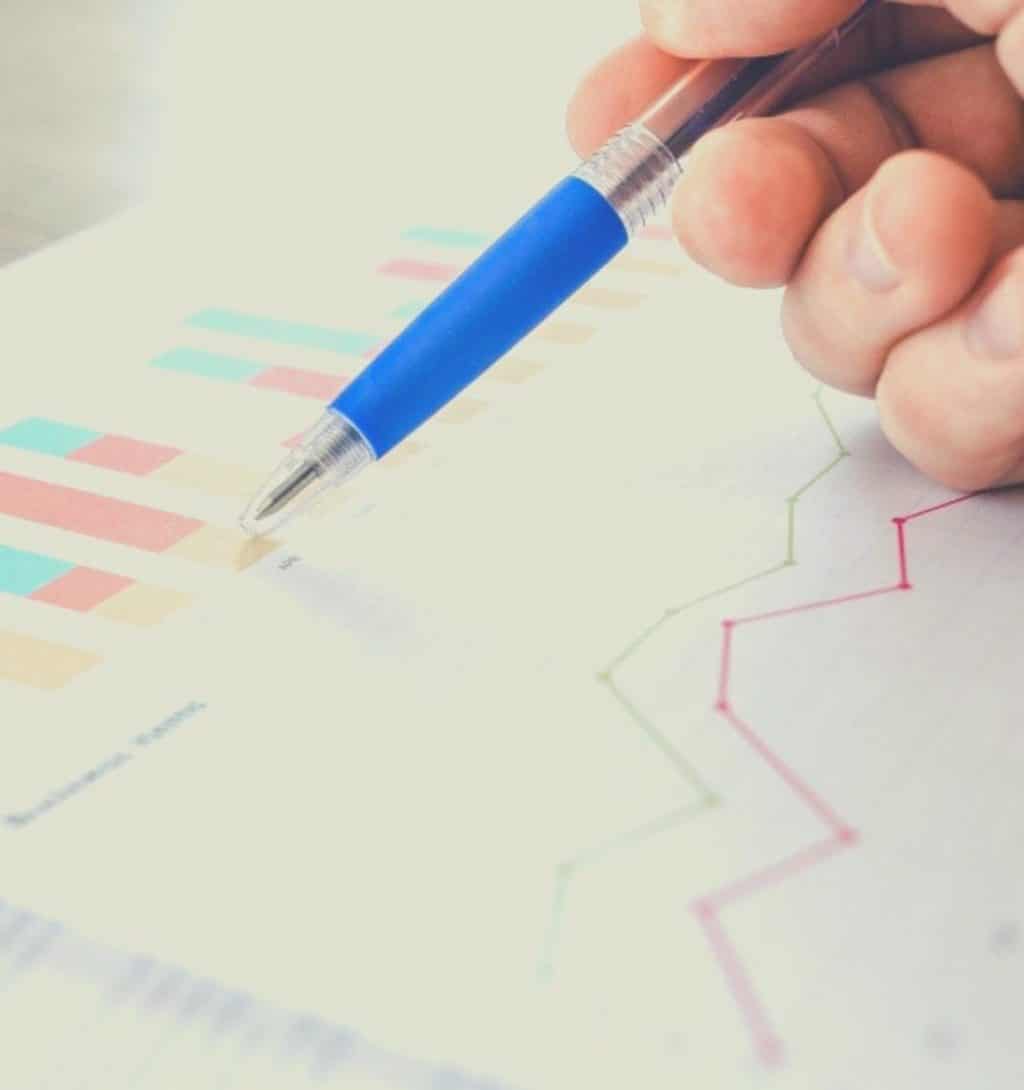
When evaluating your condition, healthcare professionals (counselors, psychotherapists, psychiatrist) often rely on clinical interviews and psychological tests.
A clinical interview is a structured set of questions that help clinicians gain a better understanding of your condition. Since anxiety differs from one person to another, counselors and therapists need to determine where, when, and how your anxiety tends to manifest.
And once they gain a clear picture of how this problem affects your day-to-day life, they can start focusing on a personalized intervention plan to help you manage social anxiety and improve the overall quality of your life.
However, there is one significant downside to clinical interviews. Since this process involves two people – one asking the questions and the other providing the answers – there’s always the issue of subjectivity.
And that’s why a true professional will always rely on standardized tests that offer an objective, unbiased perspective.
Psychological testing (or assessment) is the multitude of standardized measurements aimed at highlighting various features or the human psyche.
Some tests contain statements or questions (experts call them ‘items’) that each person can respond differently, without any right or wrong answers. Other tests contain various tasks that you need to solve in a specific manner to score points.
But regardless of the test, your results will be interpreted based on a set of statistical standards valid for a specific population pool. In other words, the final score will be an objective measure of your anxiety.
Over the last decades, researchers and clinicians have developed a wide range of measurement tools for social anxiety such as the Social Phobia Inventory or the Liebowitz Social Anxiety Scale. [5]
When it comes to social anxiety tests, most instruments contain items that evaluate the main symptoms of this condition. There are no ‘right’ or ‘wrong’ answers.
But before you find a professional who can provide an in-depth evaluation, you can always try an online anxiety test.
6 Social Anxiety Tests to Help You Assess Your Condition:
1. PsychologyToday.com
Psychology Today is among the most popular publications dedicated to making psychology accessible to the general public. Both their blogs and printed versions feature world-renowned experts who seek to help readers understand the ins and outs of the human mind.
From helpful tips on how to overcome various emotional problems to self-help strategies that promote personal and professional growth, this publication is a valuable resource for anyone interested in psychology, personal development, and human potential.
But aside from quality content and insightful interviews, PsychologyToday.com also offers social anxiety test to help you figure out what you’re dealing with.
The test made up of 36 items that evaluate various aspects of social anxiety and takes about ten minutes to complete. Once you complete all 36 items, you will get a summary detailing the social situations that make you feel anxious.
For only 6.95$, you can even get an in-depth analysis of your social anxiety.
2. Anxietycentre.com
Anxietycentre.com is a website that specializes exclusively on anxiety disorders.
Through quality content and helpful tips, they promote scientifically valid approaches to treating anxiety and other related problems.
If you’re interested in getting a professional opinion about your condition, you can even contact a therapist via their website.
Since anxiety is their primary focus, the site offers a simple 10-item social anxiety test that provides a general assessment of your problem.
After you answer all 10 items, you will receive a score that indicates your level of anxiety and a brief interpretation. Although it might not be enough to draw a definitive conclusion, it does help you gain a general sense of what you’re dealing with.
From there on out, you can contact a counselor or therapist who can provide a detailed evaluation and suggest a personalized intervention strategy.
3. Psycom.net
Psycom.net is an online mental health platform that offers tons of useful information and quizzes.
In terms of content, this website usually addresses topics surrounding anxiety, depression, bipolar disorder, ADHD, trauma, schizophrenia, addictions, and eating disorders. Pretty much anything related to mental illness.
As you can imagine, Psycom.net can be a valuable mental health resource for those of us who wish to learn more about the emotional or behavioral problems we might be dealing with.
If you think you might be dealing with social anxiety, this platform offers a handy self-assessment tool that helps you figure out the severity of your condition.
With only 8 items, their social anxiety test takes about one or two minutes to complete. Based on your answers, you will receive a brief description that captures the severity of your condition.
You can even submit to their newsletter if you’re interested in getting to know more about mental health.
4. Socialanxietyinstitute.org
As the name suggests, Socialanxietyinstitute.org is a website that focuses on providing help to those who struggle with social anxiety.
From videos and book recommendations to inspirational success stories and a forum dedicated to people who are dealing with social anxiety, this website is a precious online resource.
In fact, if you seek professional help, Socialanxietyinstitute.org offers online therapy sessions where you can get in touch with a licensed mental health professional.
But before you decide to opt for therapy, first you need to understand what you’re dealing with. And for that reason, there’s a quick social anxiety test you can take to determine the severity of your condition.
The test is made up of 30 items, based on the diagnostic criteria for social anxiety disorder. The minimum score is 0 points while the maximum score is 90. Depending on where you ‘fall’ within this interval, you will get a brief message explaining the severity of your anxiety.
5. Liebowitz Social Anxiety Scale
The Liebowitz Social Anxiety Scale is among the most popular social anxiety tests, used by clinicians and mental health professionals from all over the world.
The scale contains 24 items that assess some of the main symptoms of social anxiety disorder. Unlike other tests, The Liebowitz Scale focuses on two crucial aspects of anxiety: fear and avoidance.
In other words, each item describes a situation/context that poses difficulties to people with social anxiety, and you are required to evaluate both the intensity of the fear that you experience and your tendency to avoid that specific context. That means you need to provide two answers for each item.
As for the results, the scale calculates three scores: the total score for fear, the total score for avoidance, and the combined score. Scores below 55 indicate little or no social anxiety. Anything above could point towards a problematic case of anxiety.
6. Social Phobia Inventory
Developed by the Psychiatry and Behavioral Sciences Department at Duke University, the Social Phobia Inventory (or SPIN) is a sharp instrument for evaluating social anxiety.
With solid psychometric properties [6] and a highly-accessible format, this measurement tool proves extremely useful for counselors and therapists who wish to evaluate their client’s condition.
The test contains 17 items that describe various situations/context that people with social anxiety may find difficult to handle. Scores between 31 and 40 indicate moderate social anxiety. Anything below 31 indicates low levels of anxiety while scores above 40 indicate a severe form of social anxiety.
Can Social Anxiety Be Cured?
Well… it depends on what you mean by ‘cured.’
Since anxiety is a built-in mechanism that has helped – and is still helping us – avoid dangerous situations, we can’t just eliminate it.
But what we can do is learn to spot its signs and manage it so that it doesn’t ‘go off’ every time we worry about something terrible that might happen.
In the case of social anxiety, the best way to keep it in check is by putting yourself out there. In other words, you need to the exact opposite of what your anxious mind is telling you to do.
Hang out with your friends more often; try a new bar or restaurant; go somewhere where you’ve never been before; welcome novelty into your life. And if that doesn’t work, perhaps it’s time to visit a professional who can help you deal with social anxiety and enjoy a happier life.
Not only that you’ll avoid falling into the same mental traps that are keeping you in the comfort zone, but you will also enjoy new experiences and take advantage of exciting growth opportunities.
And I know it may seem hard right now, especially when your anxious mind keeps telling you to remain in the comfort zone. But with a bit of effort and determination on your part, you will get past your fears and enjoy a healthy social life.
Final Thoughts
Overall, there are plenty of cheap and accessible ways to evaluate your anxiety.
If you think you might be dealing with social anxiety, visit the websites I recommended earlier to get a better sense of what you’re up against.
But no matter how accessible online anxiety tests might be, they can never replace the educated opinion of a licensed mental health professional.
Just as people are different from each other, so does one case of social anxiety differ from the rest.
Some might find it difficult to be around strangers while others can’t find the courage to ask a girl/boy out. Some might refuse to eat in public while others avoid keeping presentations in front of an audience.
The point is, standardized testing doesn’t always catch these subtle nuances of social anxiety. And this is where a sharp clinician can make a difference.
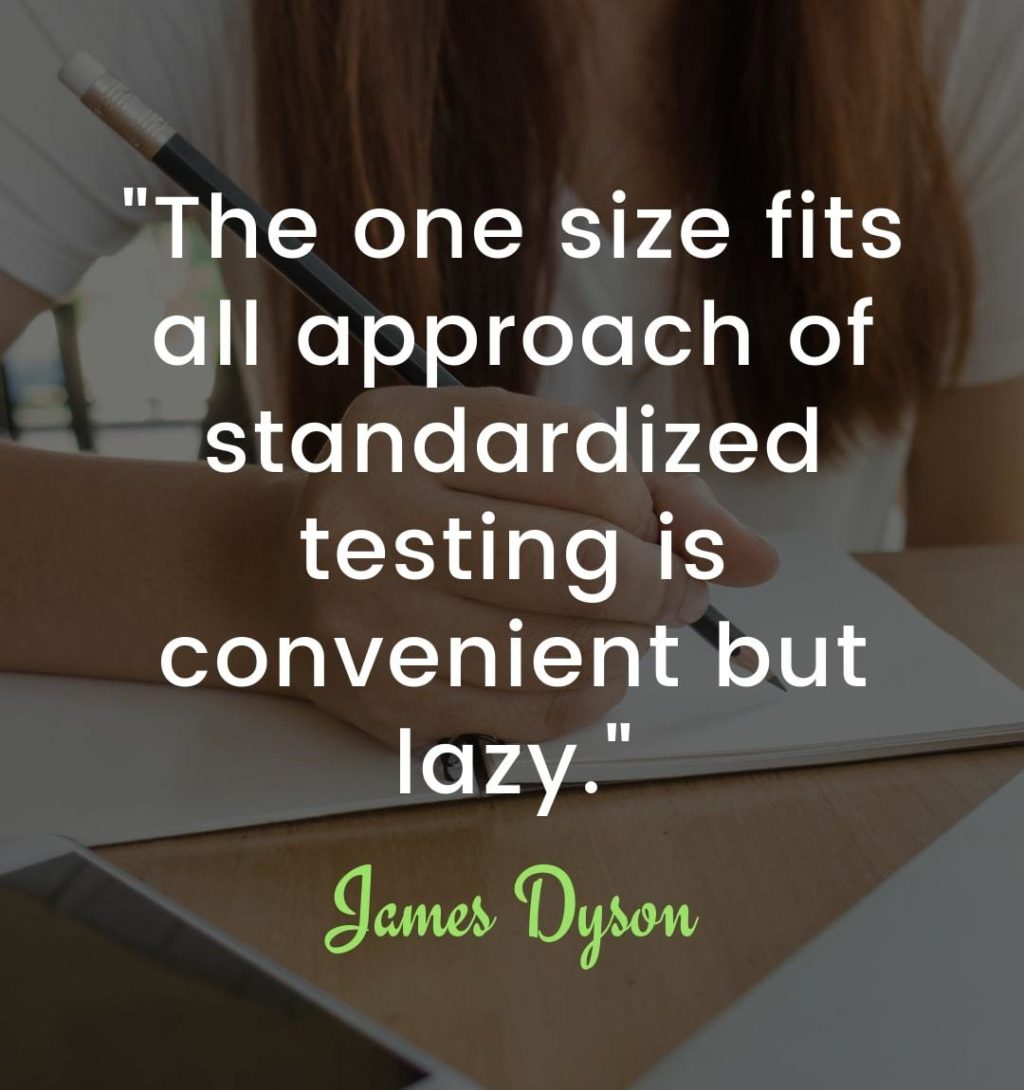
Using a structured clinical interview, mental health professionals can reach an in-depth understanding of the problems you’re dealing with. That, in turn, will help them design a personalized intervention plan that targets your particular case of social anxiety.
In the end, living a happy and fulfilling life means investing in healthy habits while being mindful of the problems that might threaten your sense of well-being.
If you feel like anxiety might be getting in your way, taking a quick social anxiety test is the simplest, most accessible step that’s within your power to reach.
One way to cope with anxiety is by becoming mindful of every moment. If you’re interested in developing a mindfulness habit, I recommend The Mindfulness Journal. It features actionable writing prompts that are designed to deepen your appreciation for each day of the year.
Related Articles & Research
[1] n.a., “Facts & Statistics,” Anxiety and Depression Association of America, n.a.. [Online]. Available: https://adaa.org/about-adaa/press-room/facts-statistics.
[2] A. Öztürk and T. Multu, “The relationship between attachment style, subjective well-being, happiness and social anxiety among university students,” Procedia – Social and Behavioral Sciences, vol. 9, p. 1772–1776, 2010.
[3] A. Weinstein, D. Dorani, R. Elhadif, Y. Bukovza and A. Yarmulnik, “Internet addiction is associated with social,” Annals of Clinical Psychiatry, vol. 27, no. 1, 2015.
[4] L. Mendes Oliveira, M. Bermudez Bagatin, d. A. Macedo, M. Joice and I. Passos Cavalcante, “Comorbid social anxiety disorder in patients with alcohol use disorder: A systematic review,” Journal of Psychiatric Research, vol. 106, pp. 8-14, 2018.
[5] d. L. Osório, Flávia, J. A. de Souza Crippa and S. R. Loureiro, “Instruments for the assessment of social anxiety disorder: Validation studies,” World Journal of Psychiatry, vol. 2, no. 5, pp. 83-85, 2012.
[6] K. M. Connor, J. R. T. Davidson, E. L. Churchill, A. Sherwood, R. H. Weisler and E. Foa, “Psychometric properties of the Social Phobia Inventory (SPIN): New self-rating scale,” The British Journal of Psychiatry, vol. 176, no. 4, pp. 379-386, 2000.
Finally, if you want a simple way to reduce your stress and anxiety, then try writing these 35 mindfulness journaling prompts to live more in the present moment.
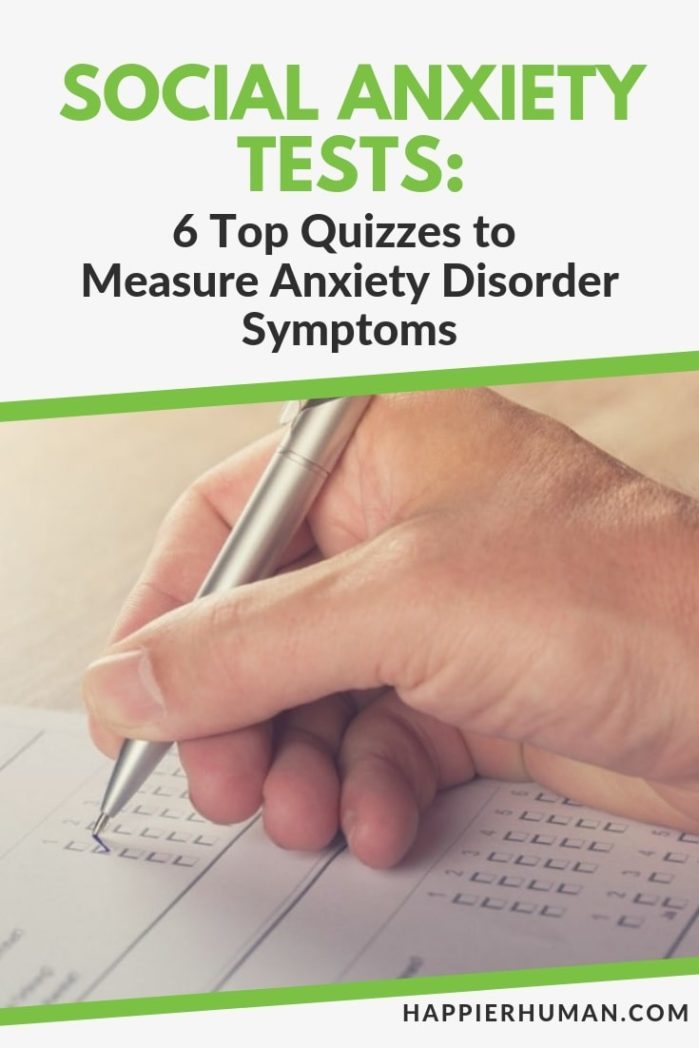

ABOUT THE AUTHOR: Alexander Draghici is a licensed Clinical Psychologist, CBT practitioner and co-founder at psycheguide.com. His work focuses mainly on strategies designed to help people manage and prevent two of the most common mental issues – anxiety and depression.

